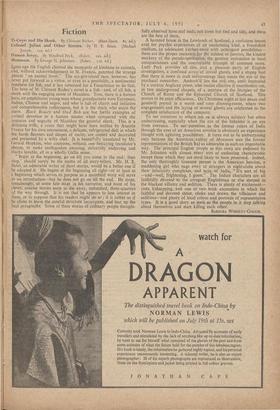Fiction
Ti-Coyo and His Shark. By Clinnent Richer. (Hart-Davis. Colonel Julian and Other Stories. By II. E. Bates.
8s. 6d.) (Michael
Joseph. los. 6d.) 11pNG ago the English claimed the monopoly of kindness to animals, and, without acknowledgement to St. Francis, patented the strange phrase " an animal lover." The sea-girt-island race, however, has never put forward as a.virtue, or even as a possibility, a sentimental fondness for fish, and it has remained for a Frenchman to do that. The hero of M. Clement Richer's novel is a fish—and, of all fish, a shark with the engaging name of Manidou. True, there is a human hero, an amphibious young man whose grandparents were European, Indian, Chinese and negro, and who is full of charm and initiative and comprehensible ruthlessness, but it is the shark who steals the show. Black Beauty and Owd Bob are but feeble examples of animal devotion to a human master when compared with the resource and sagacity of Manidou the grateful shark. This is a delicious trifle, a conte that might have been written by Anatole France for his own amusement, a delicate, refrigerated dish in which the harsh flavours and shapes of reality are cooled and decorated and presented by a witty chef. Jt is beautifully translated by Mr. Gerard Hopkins, who contrives, without one betraying translator's phrase, to make earthquakes amusing, deformity endearing and sharks lovable, all in a wholly Gallic sense.
Begin at the beginning, go on till you come to the end: then qop," should surely be the motto of all story-tellers. Mr, H. E. Bates, an admirable writer of short stories, would be a better one if he adopted it. He begins at the beginning all right—or at least at a beginning which serves its purpose as a mumbled word will serve as an introduction—but he does not go on till the end. He stops, tantalisingly, at some late stage in his narrative, and most of his clever, concise stories seem to die away, unfinished, three-quarters of the way through. It is not that he appears to lose interest in them, or to suppose that his readers might do so ; it is rather as if he chose to leave the careful structure incomplete, and tear up the final paragraphs. Some of these stories of ordinary people thought- fully, observed have real ends, not loose but tied and tidy, and these are the best of them.
A haunted house in the Lowlands of Scotland, a credulous tenant avid for psychic experiences of an unalarming kind, a fraudulent medium, an adolescent kitchen-maid with poltergeist possibilities— these are the proper materials for the mildest of horrors, the kindest mockery of the pseudo-spiritualist, the gentlest instruction in local antiquarianism and the comfortable triumph of common sense. Lady Peck provides all this, and a pleasant party of English investigators, a confused array of unlaid ghosts, and a strong hint that there is more in such surroundings than meets the eye of the psychical researcher. Ambush'd lies the evil one, until frustrated by a curious Anglican priest, who makes effective if unorthodox use, in two underground chapels, of a mixture of the liturgies of the Church of Rome and the Episcopal Church of Scotland. This proves to be most efficacious.. On Christmas night at last peace and goodwill prevail in a warm and cosy drawing-room, where two engagements and the laying of several ghosts are celebrated to the complete satisfaction of the company.
To see ourselves as others see us is always salutary but often embarrassing, especially when the eye of the beholder is an eye from overseas. To see ourselves as the former rulers of India through the eyes of an American novelist is obviously an experience fraught with agitating possibilities. It turns out to be embarrassing only because the American) author of Monsoon sees the former representatives of the British Raj as admirable in such an improbable way. The principal English people in this story are endowed by Mr. Johnston with almost every sort of .endearing characteristic except those which they are most likely to have possessed. Indeed, the only thoroughly tiresome person is the American heroine, a maddening girl who nags away at strangers in night-clubs about their inferiority complexes, and says, of India, " It's sort of big —acid–.-well, frightening, I guess." The Indian characters are all faithfully devoted to the arrogant Englishman or else steeped in the blackest villainy and sedition. There is plenty of excitement— riots, kidnapping, and one or two brisk encounters in which the faithful and devoted shbot, choke and drown the villainous and seditious—and plenty of local colour and portraits of representative types. It is a good story as soon as the people in it stop, talking about themselves and start killing each other.
BARBARA WORSLEY-GOUGH.






















































 Previous page
Previous page